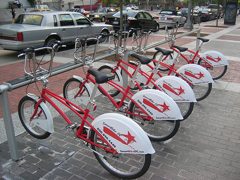
After several months of delay following the initial “launch”, Washington D.C. is basking in the glow of becoming the first large U.S. city to offer a bike-sharing system.
Will their approach work? Should Portland be jealous? Why weren’t we first?
Dubbed SmartBike DC and operated by Clear Channel Outdoor, the service offers a total of 120 bikes at 10 stations in and around D.C.’s downtown core. For keen bike-sharing observers, that small number should raise immediate concerns. When the French launched their Velib’ system in Paris over a year ago, they started with 10,000 bicycles at 750 rental stations.
“We’re not interested in being first, we’re interested in getting it right.”
— Commissioner Adams’ Chief of Staff Tom Miller
A program of similar size to SmartBike DC is being used in Brussels, and officials there have had trouble getting it to catch on. The widely-read TreeHugger blog pointed out the problems with a story titled, Free Bikes Flop in Brussels, published back in January. Reasons for the lackluster success include not having enough bikes available and not renting them for free (users of D.C.’s system must pay an annual fee).
The lesson seems to be that simply having a bike-sharing system in place does not guarantee success.
Even so, D.C.’s bike-sharing launch immediately made some wonder why Portland didn’t do it first. After all, we’re considered America’s most bike-friendly city and we’ve been chewing on the idea for well over year (see all my coverage here).
A local weekly paper says it has to do with dollars and sense. That’s true; In Portland, the financial realities of a bike-sharing system mean our plans must take a different path.
Oregon’s Supreme Court has interpreted the First Amendment in a way that does not allow cities to have private advertising in the public right-of-way (and billboard-laden bikes are in the right-of-way). In D.C., and other cities, private ads on the bikes are the key way programs costs are recouped. Also, as the Willamette Week story points out, Portland’s bus shelters are managed/owned by TriMet, not the City.
These financial constraints mean that in Portland, the City will have to make a considerable investment in the bike-sharing program.
According to Commissioner Sam Adams’ Chief of Staff Tom Miller, that’s one reason they’re moving forward cautiously. With “significant public contribution” at stake, they simply don’t want to rush into it (just imagine the backlash if it fails).
“We’re not interested in being first,” Miller told me yesterday, “we’re interested in getting it right.”
Miller says he’s watching D.C.’s progress and that he thinks the scope of their system is too limited and “that’s a mistake.”
“D.C. can be Brussels,” he added, “we’d be happy being Paris.”
——-
— Read more stories about Portland’s bike-sharing plans in the BikePortland archives.

